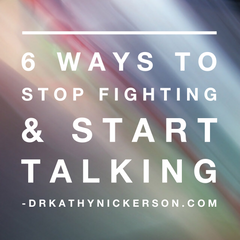
Fighting actually changes our neurochemistry and physiology, which means that the effects of a fight last far longer than the fight itself. Frequent fighting means your body stays in this altered, agitated state for longer periods of time and with each fight, the stress chemicals increase, which makes another fight more likely.
To break this fighting cycle, I'd like you to think of yourself like a scientist. I want you to think of each fight as an experiment, where you need to change only one thing each time. Each fight, change just one thing and note the results. Keep experimenting, keep observing. Pretty soon, you'll realize the "secret formula" for you and your spouse
To help you find this secret formula, here are 6 different techniques to experiment with. Please try each one and make notes about which ones work best for you. Keep what works, discard what doesn't. Share and discuss your observations with your spouse so the two of you can fine tune your approach.
1. Soften up. Be warmer, be friendlier, acknowledge what you hear that makes sense to you. People want to work with and listen to someone who acts like a teddy bear, not a prickly cactus.
2. Describe how you are feeling. Explain your perspective without judging or blaming the other person. Use emotional language and talk about feelings where appropriate. For example, say "I am hurt because I feel like I am not a priority for you."
3. Stop listening like a lawyer and preparing your defense. Instead, flip a coin (pick a number or play rock/scissors/paper) to determine who will speak first and who will listen; then switch roles after 2 minutes. While you're listening like a lawyer, you're not really listening at all. You're thinking about what argument you're going to present when it's your turn to talk. So, force yourself out of this pattern, push yourself to really listen to your spouse and try to understand his/her perspective. Listen for where you can bend and offer compromises.
4. Take frequent breaks. During each break, do something to calm yourself down. Go for a walk, listen to your favorite song, do 5 minutes of yoga, watch a relaxation video, re-read a love letter from your spouse. Do anything you like that calms you down and soothes you.
5. Try adding some structure to your arguments. Try the 5-5-3-3-2-2 + Hallmark approach. Person 1 talks for 5 minutes, while the other person listens. Then person 2, while person 1 listens, for 5 minutes. Then person 1 responds for 3 minutes, followed by person 2 for 3 minutes. Then person 1 wraps up for 2 minutes, followed by person 2 for 2 minutes. To conclude, each of you should say something loving and emotional, like something you'd write in a Hallmark card. Emotional "Hallmark" moments help soothe your partner and encourage positive changes to take place.
6. Play Let's Make A Deal. Ask for something you need in exchange for something your partner wants. For example, you might say, "Honey, I really want to go to my Mom's house for Thanksgiving this year. Let's make a deal: I'll do something you'd like if you'll come with me to Mom's. What can I do for you that will make this a good deal for both of us?" Deals should be fair and be acceptable to both partners. Don't agree to do something you'll resent.
Get Your FREE Relationship Transformation Kit Here...

